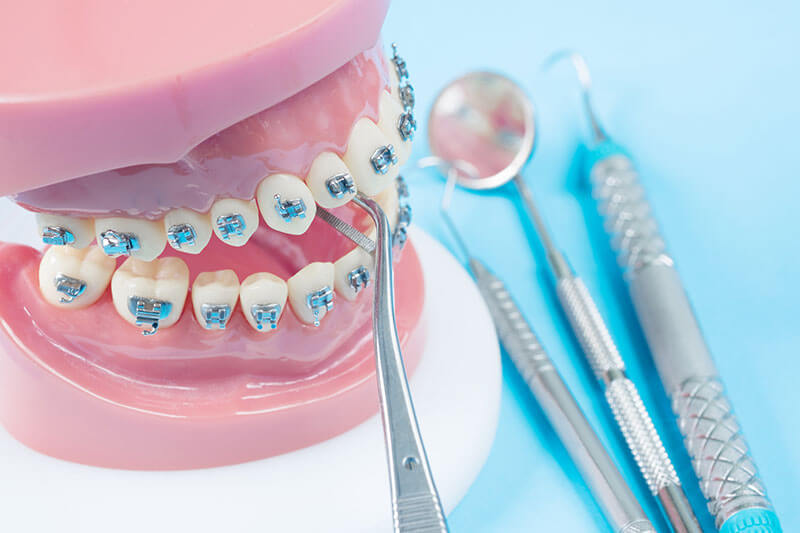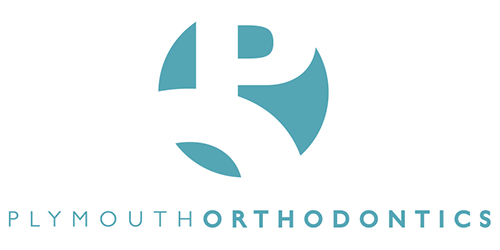Comprehensive Treatment
What is Comprehensive Orthodontic Treatment?
Comprehensive orthodontic treatment is the most common type of treatment that patients receive and completely corrects bite problems from start-to-finish in one stage. It is appropriate for young adults and children who have lost all or almost all of their baby teeth. In general, it involves use of braces on upper and/or lower teeth to shift or correct bite problems.

How long does orthodontic treatment take?
In general, orthodontic treatment ranges from less than a year to three years, but the average is typically 2 to 2½ years in length. The actual treatment time depends on the severity of the original bite problem, the growth of the jaws and face, the degree of movement possible, and the cooperation of the patient. It is important to remember that some individuals simply respond faster to treatment than others. At Plymouth Orthodontics, we maximize the progress made at each patient’s appointment by using high quality materials and the latest orthodontic techniques to make your treatment as efficient as possible.
Will I have any teeth removed for braces?
Removing teeth is sometimes needed to get the best orthodontic result. It’s a technique involving the removal of selected teeth to make room for the other teeth in your child’s or your mouth. Straight teeth and a balanced facial profile are always the goal. However, because today’s technology has resulted in advanced orthodontic procedures, the need for removing teeth has been greatly reduced.
Can I still have braces if I have missing teeth?
When teeth are missing, adjacent teeth will drift into the empty space. This will cause functional, esthetic and/or periodontal problems. Orthodontic treatment will correct and prevent these problems from happening and will also provide proper alignment for your dentist to replace the missing teeth.

Will I need surgery?
The health of the teeth, gums, and supporting bone is very important to the success of orthodontic treatment in adults as well as children. Sometimes, orthodontic treatment may have to be combined with the efforts of an oral surgeon to achieve the final result. At the initial visit we will determine if orthognathic surgery is the correct treatment option for you.
How often will I need office visits?
Appointments are scheduled according to each individual patient’s needs. Most patients in braces will be seen on average every six to eight weeks. If there are specific situations that require more frequent monitoring, appointments may be scheduled more often.
Will treatment hurt?
Orthodontic treatment has improved dramatically. The braces themselves are now much smaller and less cumbersome than in the past. We use high tech, light force wires to initiate tooth movement. This not only results in less pressure on the teeth but also means that your treatment will be more comfortable. As a rule, braces make your teeth sore for a few days, but it is not painful. This temporary annoyance can be relieved with an over-the-counter pain reliever, such as acetaminophen (Tylenol) or ibuprofen (Advil, Motrin).

Will I still be able to play sports?
It is recommended that patients protect their smiles by wearing a mouth guard when participating in any sporting activity. Mouth guards are inexpensive, comfortable, and come in a wide variety of colors. They can be purchased at most sporting goods stores.
Will braces interfere with playing instruments?
Most patients with braces continue to play their musical instruments. There may be an initial period of adjustment. In addition, braces cover can be provided to prevent discomfort.
What happens when my braces come off?
The retention phase is the final step of orthodontic treatment. Removable retainers are worn full-time (except while eating and brushing) in the initial retention phase, then only at night in later months. The purpose of the retention phase is to help stabilize the teeth in their new position and ensure the dazzling new smile will remain for a lifetime, as exact and precise as it was the moment the braces were removed. During the period of night-only wear, we have a chance to evaluate the natural stability of the orthodontic correction and decide if tapering the amount of wear of the retainers is appropriate. For individuals with stubborn teeth that try to return to their pre-treated position and for many adults, routine night wear is the best insurance that their teeth will stay aligned.
The best way to learn what orthodontic treatment could do for you or your child is to call Plymouth Orthodontics at (734) 455-2323. We are always available to talk with you and address your concerns. Please feel free to contact us during office hours.
